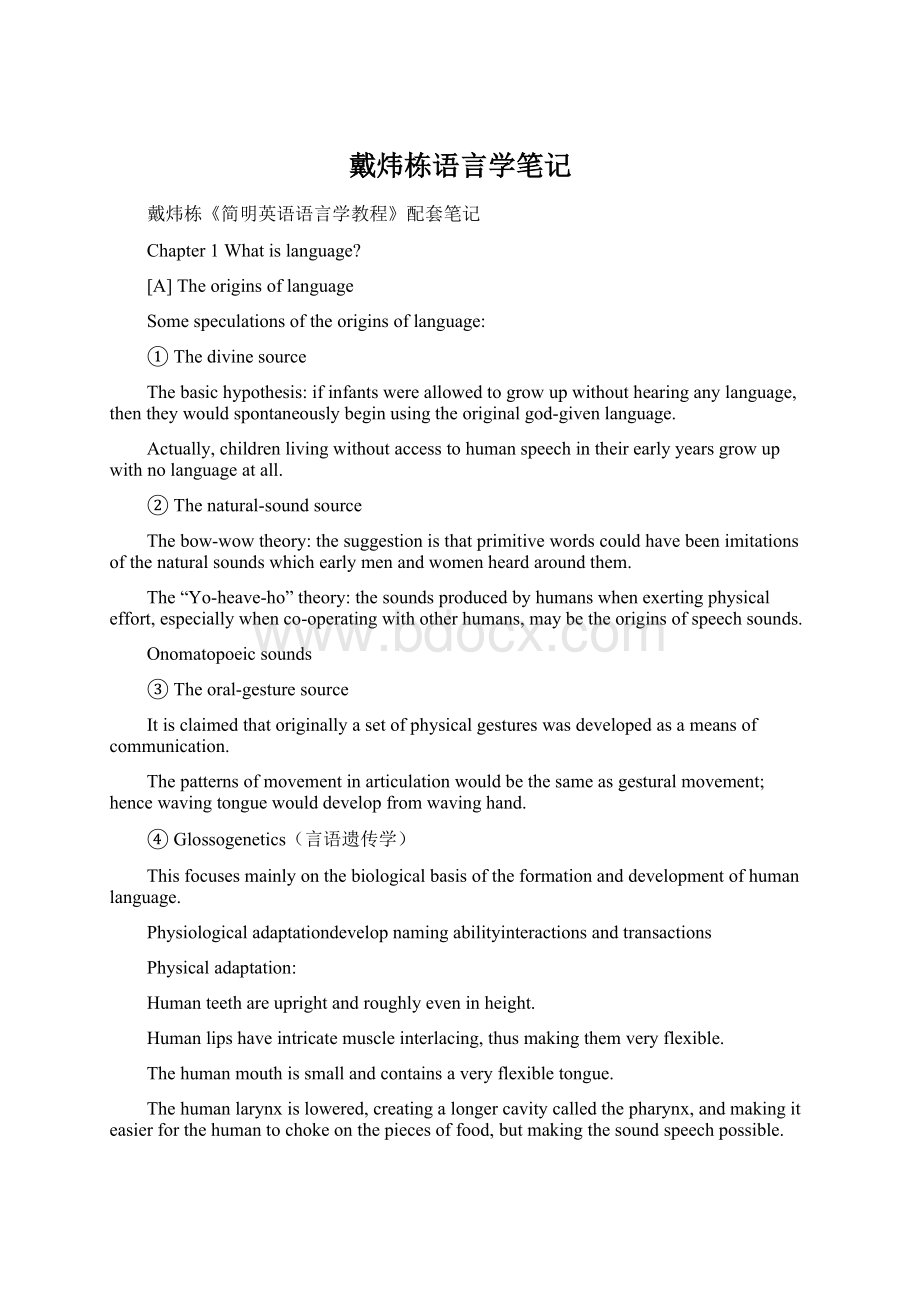戴炜栋语言学笔记.docx
《戴炜栋语言学笔记.docx》由会员分享,可在线阅读,更多相关《戴炜栋语言学笔记.docx(38页珍藏版)》请在冰豆网上搜索。

戴炜栋语言学笔记
戴炜栋《简明英语语言学教程》配套笔记
Chapter1Whatislanguage?
[A]Theoriginsoflanguage
Somespeculationsoftheoriginsoflanguage:
①Thedivinesource
Thebasichypothesis:
ifinfantswereallowedtogrowupwithouthearinganylanguage,thentheywouldspontaneouslybeginusingtheoriginalgod-givenlanguage.
Actually,childrenlivingwithoutaccesstohumanspeechintheirearlyyearsgrowupwithnolanguageatall.
②Thenatural-soundsource
Thebow-wowtheory:
thesuggestionisthatprimitivewordscouldhavebeenimitationsofthenaturalsoundswhichearlymenandwomenheardaroundthem.
The“Yo-heave-ho”theory:
thesoundsproducedbyhumanswhenexertingphysicaleffort,especiallywhenco-operatingwithotherhumans,maybetheoriginsofspeechsounds.
Onomatopoeicsounds
③Theoral-gesturesource
Itisclaimedthatoriginallyasetofphysicalgestureswasdevelopedasameansofcommunication.
Thepatternsofmovementinarticulationwouldbethesameasgesturalmovement;hencewavingtonguewoulddevelopfromwavinghand.
④Glossogenetics(言语遗传学)
Thisfocusesmainlyonthebiologicalbasisoftheformationanddevelopmentofhumanlanguage.
Physiologicaladaptationdevelopnamingabilityinteractionsandtransactions
Physicaladaptation:
Humanteethareuprightandroughlyeveninheight.
Humanlipshaveintricatemuscleinterlacing,thusmakingthemveryflexible.
Thehumanmouthissmallandcontainsaveryflexibletongue.
Thehumanlarynxislowered,creatingalongercavitycalledthepharynx,andmakingiteasierforthehumantochokeonthepiecesoffood,butmakingthesoundspeechpossible.
Thehumanbrainislateralized.Thoseanalyticfunctions(tool-usingandlanguage)arelargelyconfinedtothelefthemisphereofthebrainformosthumans.
Twomajorfunctionsoflanguage:
Interactional:
asocialfunctionoflanguage.
Transactional:
afunctioninvolvingthecommunicationofknowledgeandinformation
[B]Thepropertiesoflanguage
Languageisasystemofarbitraryvocalsymbolsusedforhumancommunication.
a)System:
combinedtogetheraccordingtorules
b)Arbitrary:
nointrinsicconnectionbetweentheword“pen”andthethingintheworldwhichitrefersto
c)Vocal:
theprimarymediumissoundforalllanguages
d)Human:
languageishuman-specific(交际性与信息性)
Communicativevs.Informative:
Communicative:
intentionallyusinglanguagetocommunicatesomething
Informative:
through/viaanumberofsignalsthatarenotintentionallysent
Designfeatures(uniqueproperties):
thedefiningpropertiesofhumanlanguagethatdistinguishitfromanyanimalsystemofcommunication
①Displacement(跨时空性,移位性)
Languagecanbeusedtorefertocontextsremovedfromtheimmediatesituationsofthespeaker(refertopastandfuturetimeandtootherlocations)
②Arbitrariness(任意性)
Thereisnologicalornaturalconnectionbetweenalinguisticform(eithersoundorword)anditsmeaning.
Whilelanguageisarbitrarybynature,itisnotentirelyarbitrary.
a)echoofthesoundsofobjectsoractivities:
onomatopoeicwords
b)somecompoundwords
③Productivity(能产性,创造性)
Languageisproductiveinthatitmakespossibletheconstructionandinterpretationofnewsignalsbyitsusers.(Creativityoropen-endedness)
④Culturaltransition(文化传递性)
Whilehumancapacityforlanguagehasageneticbasis(everyonewasbornwiththeabilitytoacquirealanguage),thedetailsofanylanguagesystemarenotgeneticallytransmitted,butinsteadhavetobetaughtandlearnt.
⑤Discreteness(可分离性)
Eachsoundinthelanguageistreatedasdiscrete.
⑥Duality(双重结构性,两重性或二元性)
Languageisorganizedattwolevelsorlayerssimultaneously.Thelowerorbasiclevelisastructureofsoundswhicharemeaningless.Thehigherlevelismorphemeorword(doublearticulation)
Theabovesixpropertiesmaybetakenasthecorefeaturesofhumanlanguage.
Vocal-auditorychannel,reciprocity,specialization,non-directionality,orrapidfade,thesepropertiesarebesttreatedaswaysofdescribinghumanlanguage,butnotasameansofdistinguishingitfromothersystemsofcommunication.
[C]Thedevelopmentofwrittenlanguage
①pictograms&ideograms(象形文字和表意文字)
Pictogram:
whensomeofthepicturescametorepresentparticularimagesinaconsistentway,wecanbegintodescribetheproductasaformofpicture-writing,orpictograms.
Ideogram:
thepicturedevelopedasmoreabstractandusedotherthanitsentityisconsideredtobepartofasystemofidea-writing,orideogram
Hieroglyph:
古埃及象形文字
②Logograms(语标书写法)
Whensymbolscometobeusedtorepresentwordsinalanguage,theyaredescribedasexamplesofword-writing,orlogograms.
“Arbitrariness”—awritingsystemwhichwasword-basedhadcomeintoexistence.
Cuneiform--楔形文字—theSumerians(5000and6000yearsago)
Chineseisoneexampleofitsmodernwritingsystem.
Advantages:
twodifferentdialectscanbebasedonthesamewritingsystem.
Disadvantages:
vastnumberofdifferentwrittenforms.
③Syllabicwriting(音节书写法)
Whenawritingsystememploysasetofsymbolswhichrepresentthepronunciationsofsyllables,itisdescribedassyllabicwriting.
ThePhoenicians:
thefirsthumanbeingsthatappliedthefulluseofasyllabicwritingsystem(ca1000BC)
④Alphabeticwriting(字母书写法)
Semiticlanguages(ArabicandHebrew):
firstappliedthisrule
TheGreeks:
takingtheinherentlysyllabicsystemfromthePhoeniciansviatheRomans
LatinalphabetandCyrillicalphabet(Slaviclanguages)
⑤Rebuswriting
Robuswritingevolvesaprocesswherebythesymbolusedforanentitycomestobeusedforthesoundofthespokenwordusedforthatentity.
Chapter2Whatislinguistics?
[A]Thedefinitionoflinguistics
Linguisticsisgenerallydefinedasthescientificstudyoflanguage.
Processoflinguisticstudy:
①Certainlinguisticfactsareobserved,generalizationareformed;
②Hypothesesareformulated;
③Hypothesesaretestedbyfurtherobservations;
④Alinguistictheoryisconstructed.
Languageisasystemofarbitraryvocalsymbolsusedforhumancommunication.
[B]Thescopeoflinguistics
Generallinguistics:
thestudyoflanguageasawhole
Phonetics:
thegeneralstudyofthecharacteristicsofspeechsounds(orthestudyofthephonicmediumoflanguage)(Howspeechsoundsareproducedandclassified)
Phonology:
isessentiallythedescriptionofthesystemsandpatternsofspeechsoundsinalanguage.(Howsoundsformsystemsandfunctiontoconveymeaning)
Morphology:
thestudyofthewayinwhichmorphemesarearrangedtoformwords(howmorphemesarecombinedtoformwords)
Syntax:
thestudyofthoserulesthatgovernthecombinationofwordstoformpermissiblesentences(howmorphemesandwordsarecombinedtoformsentences)
Semantics:
thestudyofmeaninginabstraction
Pragmatics:
thestudyofmeaningincontextofuse
Sociolinguistics:
thestudyoflanguagewithreferencetosociety
Psycholinguistics:
thestudyoflanguagewithreferencetotheworkingsofthemind
Appliedlinguistics:
theapplicationoflinguisticsprinciplesandtheoriestolanguageteachingandlearning
Anthropologicallinguistics,neurologicallinguistics;mathematicallinguistics;mathematicallinguistics;computationallinguistics
[C]Someimportantdistinctionsinlinguistics
①Prescriptivevs.Descriptive
②Synchronicvs.Diachronic
Thedescriptionofalanguageatsomepointintime;
Thedescriptionofalanguageasitchangesthroughtime.
③Speechandwriting
Spokenlanguageisprimary,notthewritten
④Langueandparole
ProposedbySwisslinguistsF.deSausse(sociological)
Langue:
referstotheabstractlinguisticsystemsharedbyallthemembersofaspeechcommunity
Parole:
referstotherealizationoflangueinactualuse
⑤Competenceandperformance
ProposedbytheAmericanlinguistN.Chomsky(psychological)
Competence:
theidealuser’sknowledgeoftherulesofhislanguage
Chapter3Phoneticsandphonology
[A]Thedefinitionofphonetics
Phonetics:
thestudyofthephonicmediumoflanguage:
itisconcernedwithallthesoundsthatoccurintheworld’slanguages.
Articulatoryphonetics:
thestudyofhowspeechsoundsaremade,orarticulated.
Acousticphonetics:
dealswiththephysicalpropertiesofspeechassoundwavesintheair.
Auditory(orperceptual)phonetics:
dealswiththeperception,viatheear,ofspeechsounds.
Forensicphonetics:
hasanapplicationinlegalcasesinvolvingspeakeridentificationandtheanalysisofrecordedutterances.
[B]Organsofspeech
Voiceless:
whenthevocalcordsarespreadapart,theairfromthelungspassesbetweenthemunimpeded.
Voiced:
whenthevocalcordsaredrawntogether,theairfromthelungsrepeatedpushesthemapartasitpassesthrough,creatingavibrationeffect.
AlltheEnglishvowelsaretypicallyvoiced(voicing).
Theimportantcavities:
Thepharyngealcavity
Theoralcavity
Thenasalcavity
Lips,teeth,teethridge(alveolus),hardpalate,softpalate(velum),uvula,tipoftongue,bladeoftongue,backoftongue,vocalcords
[C]Orthographicrepresentationofspeechsounds
Broadandnarrowtranscriptions
IPA(InternationalPhoneticAlphabet/Association)
Broadtranscription:
thetranscriptionwithletter-symbolsonly
Narrowtranscription:
thetranscriptionwithdiacritics
E.g.:
[l][li:
f]--aclear[l](nodiacritic)
[l][bild]--adark[l](~)
[l][hel]--adental[l]()
[p][pit]--anaspirated[ph](h)
[p][spit]--anunaspirated[p](nodiacritic)
[n][btn]asyllabicnasal[n]()
[D]ClassificationofEnglishconsonants
Intermsofmannerofarticulation(themannerinwhichobstructioniscreated)
①Stops:
theobstructionistotalorcomplete,andthengoingabruptly
[p]/[b],[t]/[d],[k]/[g]
②Fricatives:
theobstructionispartial,andtheairisforcedthroughanarrowpassageinthem